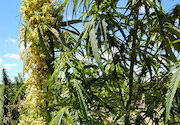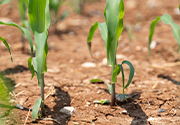| |
| |
 |
 |
| |
 |
|
@{mv_date_MMM d, yyyy}@ |
|
| |
 The CMBTC has developed a resource with information on three recently developed malt barley varieties, how they stack up against other established varieties, as well as information on yields, standability and protein.
» Read more...
The CMBTC has developed a resource with information on three recently developed malt barley varieties, how they stack up against other established varieties, as well as information on yields, standability and protein.
» Read more...
Farm Credit Canada (FCC) economists have released their grains, oilseeds and pulses outlook for the 2021 year. They share the trends and market influencers that you should keep an eye on.
» Read more...
Corteva Agriscience recently received approval for Prominex and Exhilarate, two herbicides designed to control tough broadleaf weeds in cereal crops, including cleavers, hemp-nettle, and dandelion.
» Read more...
|
| |
 |
 |
| |
|
| |

It’s that time of year again to start thinking about treating your seed, which means now’s the time to plan for your best season yet! Looking for information about on-farm treating and equipment options? Wondering how many bushels you can treat with a jug versus a tote? What product is the best agronomic fit for your crop? Or even evaluating if you should treat your seed at all? The Bayer SeedGrowth ® team has those answers and solutions designed to work for you. They’ve rounded up 7 great reasons why you should treat your seed, and some application tips that help make the process simple and headache free. By using a seed treatment you’re giving your seed the protection it needs for stronger, more even emergence, and enhanced yield potential. Read up on all the benefits of finding the right seed treatment for you, how the equipment available today makes it easier than ever to get the job done, and how treating your seed pays off in the bin.
Ready to protect your seed? |
| |
|
| |
 On-the-spot, inexpensive, easy-to-use soil and crop analysis tools could help crop growers to enhance management of their fields. Having such tools in a really convenient hand-held device would be even better. That’s why researchers like Qingshan Wei and Asim Biswas are developing smartphone-based approaches to crop and soil testing.
» Learn more
On-the-spot, inexpensive, easy-to-use soil and crop analysis tools could help crop growers to enhance management of their fields. Having such tools in a really convenient hand-held device would be even better. That’s why researchers like Qingshan Wei and Asim Biswas are developing smartphone-based approaches to crop and soil testing.
» Learn more |
| |
 According to OMAFRA’s Jim Todd, there are lots of reasons why industrial specialty crops can be a good option for Ontario field crop producers. Specialty crops could be a source of new or additional revenue, while breaking up pest cycles on the farm. But there’s also a big reason why many producers avoid them: the lack of processing capacity in the province.
» Learn more
According to OMAFRA’s Jim Todd, there are lots of reasons why industrial specialty crops can be a good option for Ontario field crop producers. Specialty crops could be a source of new or additional revenue, while breaking up pest cycles on the farm. But there’s also a big reason why many producers avoid them: the lack of processing capacity in the province.
» Learn more |
| |
 |
 |
| |
|
| |
 Have security in any weather with a finished fertilizer proven to protect against volatilization, leaching and denitrification. This solution safeguards your nitrogen through any weather condition — from dry spells to saturated soil. It also helps ensure your nitrogen stays available for the crop, allowing for maximized investments.
» Continue Reading
Have security in any weather with a finished fertilizer proven to protect against volatilization, leaching and denitrification. This solution safeguards your nitrogen through any weather condition — from dry spells to saturated soil. It also helps ensure your nitrogen stays available for the crop, allowing for maximized investments.
» Continue Reading |
| |
|
| |

|
| |
| |












